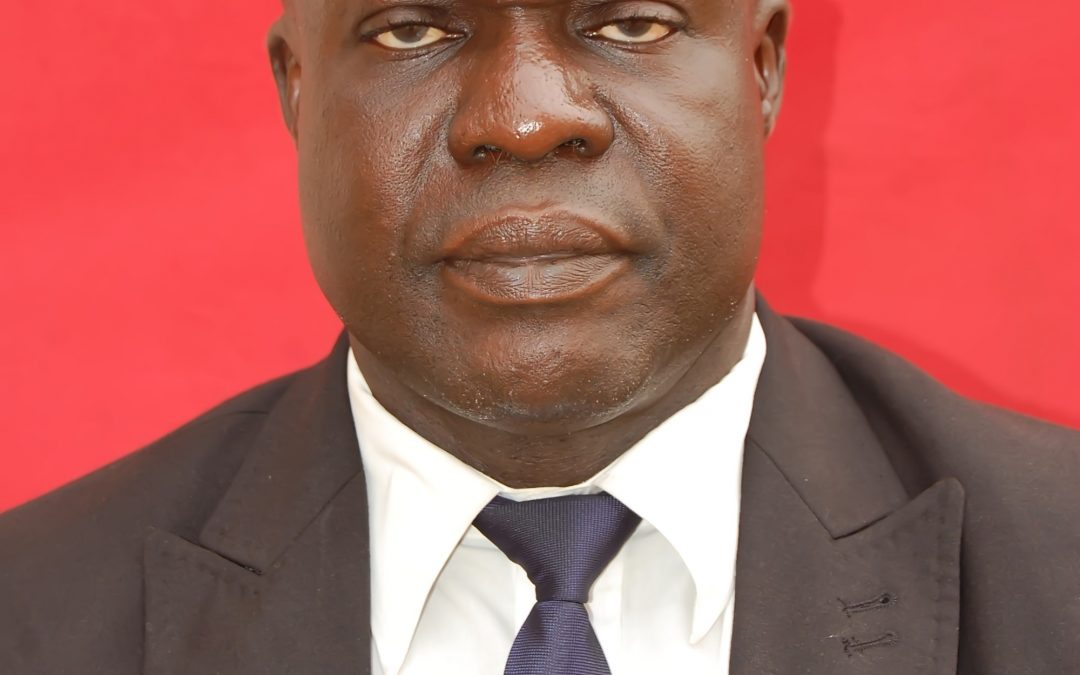
by Legalnaija | Jul 14, 2022 | Uncategorized
THE LEGAL EFFECT OF GOVERNMENT WHITE PAPER & RECCOMENDATIONS THEREIN: IN RESPECT OF THE PORTION OF OWERRI / ONITSHA ROAD INDUSTRIAL LAYOUT AND PORTION OF UMUGUMA LAND IN IMO STATE:
By
Osora F. Uzonwanne Esq.,
08033382080
4th July, 2022
INTRODUCTION: The Government of Imo State headed by Chukwuemeka Nkemakolam Ihedioha (CON) under the powers conferred on him by section 3 of the Commission of Enquiry Law (Cap.24), Laws of Eastern Nigeria, 1963 through an instrument constituted a Commission of Inquiry on Lands Related Matters which came into force on 19th day of August, 2019. The nine-man commission was chaired by Hon. Justice Florence I. Duroha-Igwe (Rtd).
The terms of reference of the commission are to wit:
- Ascertain the extent of land compulsorily acquired or forcefully wrested from the owners.
- Ascertain and determine whether such compulsory acquisition as mentioned in (a) above were lawfully made or not.
- Ascertain the extent of allocation and revocation of land in Imo State from June 2006 – May 2019 and determine the propriety of such allocation and revocation.
- Ascertain and determine whether due process and diligence and strict adherence to the provisions of Land Use Act, 1978 and all other relevant laws on acquisition of land were followed.
- Determine the extent of compliance with the relevant laws for the development of the New Owerri Capital Territory and adherence to the Master Plan of Owerri Capital Territory as authored by Fingerhurt and Partners.
- Examine and ascertain whether Government land or part of it have been converted to private use and identify the persons responsible and make recommendations for recovery.
A BRIEF HISTORY OF OKOHIA UMUNJO/ PORTION OF OWERRI/ ONITSHA ROAD INDUSTRIAL LAYOUT AND PORTION UMUGUMA LAND:
At the creation of Imo State in 1976, the Government acquired the entire expanse of land known and called OKOHIA UMUNJO/ UMUGUMA LAND, currently known as Industrial layout which was owned by the UMUNJO AND UMUGUMA COMMUNITY. The acquisition of the said land was for industrial purpose and it was done without due process and no compensation whatsoever was paid to the land owners.
The Okohia Umunjo/Umuguma land belonging to Umunjo and Umuguma Community and others was left to fallow for many years and became the den of arm robbers and kidnappers where they perpetrated all sorts of crimes.
As a result of the above, the Umunjo/Umuguma Community caused a letter to be written through their attorney to the government of Imo State dated 28th November, 2018 for the release of the said land back to them.
Through a letter dated the 14th of December, 2018 the Imo State Government released the Okohia land to the Umunjo/Umuguma Community through the Imo State Housing Corporation for the development of a layout to be called Pocket Layout.
Subsequently, there was a change of government which culminated to the assumption of the government of Rt. Hon. Emeka Ihedioha and the incident of constituting of a Judicial Commission of Inquiry into land related matters in the state.
The Umunjo/Umuguma Community petitioned the Judicial Commission of Inquiry as was required by the commission for all land owners whose land were affected to appear before the commission to make submissions of their claims to the commission.
At the end of the deliberations, the Judicial Commission of Enquiry came up with their Findings and Recommendations which was accepted by the incumbent government of Sen. Hope Uzodinma and same was passed into law and published in a White Paper, an Official Gazette.
Finally, it is worthy of note that the Umunjo Okohia and Umuguma land or Portion of Owerri/ Onitsha Road Industrial Layout is cut up and mentioned in the First, Second, Third and Fourth Terms of References of the Judicial Commission of Inquiry (as is mentioned above) in their Findings and Recommendations which is accepted by the Imo State Government. The summary of the panel’s findings and recommendations is that the said land was amongst the lands wrongly or illegally acquired by the government and there was no compensation paid to the land owners, thereby recommended that government should endevour to do the needful by following due process of acquisition of land . See: Government White Paper on the Report of the Judicial Commission of Enquiry on Lands and Related Matters Imo State (June 2006 – May 2019) published, August 2020.
THE LEGAL STATUS OF A GOVERNMENT WHITE PAPER BY A JUDICIAL COMMISSION OF INQUIRY:
It is apropos at this juncture to note that it was on the strength of the above white paper that gave impetus to the Interim Forfeiture Order by Hon. Justice E. F. Njamanze (Rtd.) on 24th February, 2021 and Final Forfeiture Order on 9th August, 2021 in Suit No. HOW/191/2021– Between: ATTORNEY GENERAL OF IMO STATE AND MRS NKECHI ROCHAS OKOROCHA & 5 ORS.
On 24th February, 2021 the court had ordered the Interim Forfeiture of all the properties linked to Okorocha. The court had also asked Okorocha to show case as to why a final and absolute order of forfeiture should not be given following an application brought to it by Louis Alozie on behalf of the state.
Okorocha through his counsel failed to give good reason why the order should not be made absolute. The court in a ruling delivered on 9th August , 2021 ordered the final forfeiture of properties said to be acquired through “illegal means” by Rochas Okorocha, ex-governor of Imo state. The forfeited properties are listed in the Imo State Government White Paper Report on recovery of lands and other related matters.
Hon. Justice Njemanze made a judicial pronouncement by saying that the White Paper Gazette by the Imo government is a legally-binding document. In defining what is white paper? Njamanze made reference to the case of TAO & SONS INDUSTIES LTD Vs GOVERNOR OF OYO STATE & ANOR (2010) LPELR 5002CA, The Court of Appeal per Kekere-Ekun JCA (as he then was) held:
“The view expressed by the court by Abdullahi Vs Hashidi at page 646 C-D is clear and straight forward. His Lordship Pats Acholonu JCA (as he then was) stated; “In the normal course of governace, the government, be it Federal, State or Local manifests its acceptance of a report or inquiry by way of publication of a White Paper which tells the world the reaction of the government to the inquiry.” The Supreme Court acknowledged the significance of a White Paper in the case of COOKEY Vs FOMBO (2005) 15 NWLR (pt. 947) 187 when it held that the 1st Respondent could not file an action against a third party on the recommendation of a panel of inquiry that had not been published in a White Paper.”
In MAJOR – GENERAL OLU BAJOWA Vs FRN & ORS (2016) LPLER-40229 CA. Ekanem JCA said:
“There is no doubt that the appellant could not have sued the Respondent in respect of the recommendation of justice Nwazota Panel because the government did not issue a white paper accepting or rejecting the same. In COOKEY Vs FOMBO (2005) 15 NWLR (pt. 947) 187 the supreme court held that the recommendation of a committee has no binding force and cannot ground a cause of action without a law or a White Paper. Also in GOVERNOR OF OYO STATE Vs FOLAYAN (1995) 1 NWLR (pt 413)292, 382. Onu JSC stated as follows “The government having not yet accepted the recommendations are legally not binding on the Government and the parties until accepted…It cannot be in doubt that where a government sets up a panel of inquiry, there must be some overt act by the government to signify its acceptance or rejection of the White Paper. The White Paper is notice to the whole world of the position taken by the government on relevant report… ” The reason is that a government that sets up a commission of inquiry is at liberty to reject or accept the recommendation of the commission. See AREMO 11 Vs ADEKANYE (2004)13 NWLR (pt 891) 571. So the Commission’s recommendation amounts to nothing until accepted by the government in a White Paper…”
The properties include Eastern Palm University, Ogboko; Royal Spring Palm Hotels and Apartments; IBC staff quarters illegally acquired for the purpose of Rochas Foundation College, Owerri; Magistrate Quarters, Orlu Road/Cooperative Office/Girls Guide Illegally converted to private use housing market square, Kilimanjaro Eatery; Public Building Plot B/2 Otamiri South Extension Layout given to the Ministry of Women Affairs for establishing a skills acquisition centre for women, illegally acquired for the benefit of Nneoma Nkechi Okorocha’s All-in Stall, Aba Road.
Others are Plot P5, Naze Residential Layout, initially part of Primary School Management Board but now annexed to All-in Stall, Aba Road belonging to Nkechi Okorocha, and all the properties contained from pages 226 to 272 of the Government White Paper on the recommendation of the Judicial Commission of Inquiry into land Administration in Imo State from June 2006 to May 2019.
Njamanze, based on the above legal backings added that the Imo State Government can go ahead and do whatever it deems fit with the properties. The judge also ruled that persons who might have purchased said properties are at liberty to approach the court to prove their titles:
“In essence, the White Paper gives the State Government power to retain custody of the properties listed therein as having been obtained or acquired in breach of the law. Any person who professes to own such properties which are found or contained in the white paper cannot lawfully walk into them without incurring the wrath of the government. At the point the government be it Federal , state, Local accepts the recommendations of the panel of inquiry and publish/gazette same as in the instant case, the properties are well taken over by the government absolutely until the person or persons affected show that the findings were patently erroneous. This can be done by taking up a writ of action to challenge the findings and recommendations contained in the white Paper or the White paper itself.”
CONCLUSION
The gamut of these write up concerns the powers of the governor of the state to constitute a judicial commission of inquiry and the legal status of the white paper gazette publishing the findings and recommendations of the commission. From the foregoing, the governor is empowered by the Commission of Inquiry Law to constitute the commission and arm it with the terms of references to base their inquiry on. From the plethora of cases cited above, and many others not cited, it is discernable that the White Paper is a notice to the world of the position of Government of Imo State over and in respect of all the lands contained therein including the Okohia Umunjo/ Umuguma Land. The Okohia Umunjo/Umuguma Land is now absolutely under the control of the State Government and the government is to synergize with the Umunjo/Umuguma Community for the appropriate compensation arrangements to be made between them according to the recommendations of the Judicial Commission of Inquiry as was published in the white paper gazette. Finally, there is a window of remedy for any aggrieved or affected person or persons to take up an action by way of a writ to challenge the white paper or the findings of the panel of inquiry by showing grounds why the property or properties should be left off the hook.
Osora Francis Uzonwanne is a PARTNER IN ADVANCED CHAMBERS, A LEGAL FIRM BASED IN OWERRI. He holds a Masters Degree in Philosophy and Currently undergoing a study for a Doctorate in Philosophy at Imo State University, Owerri.
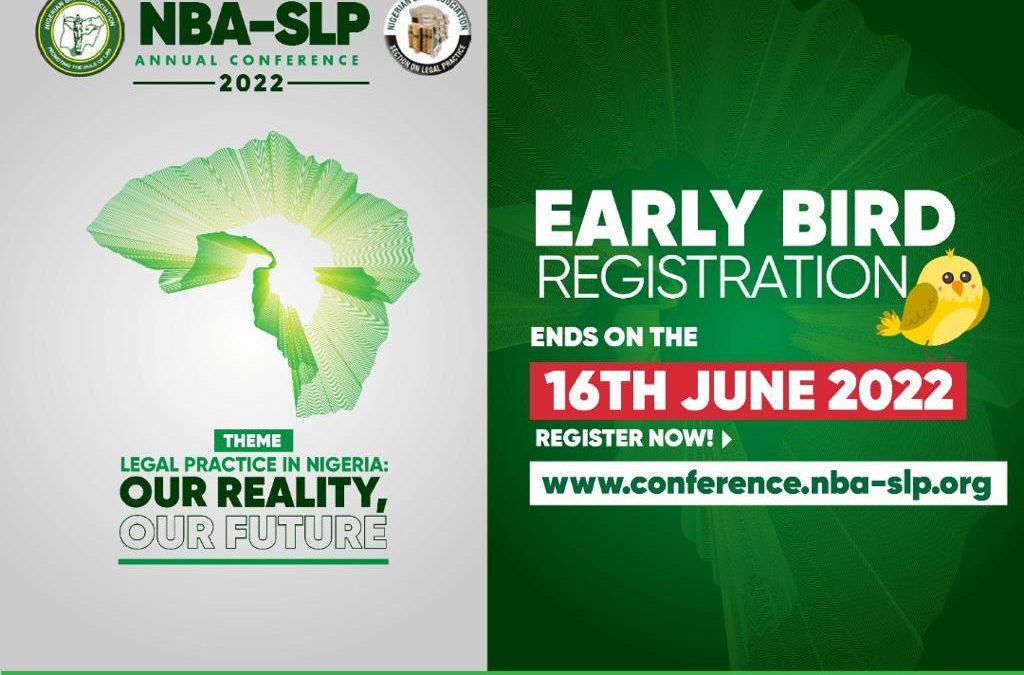
by Legalnaija | Jun 12, 2022 | Uncategorized

A New Age:The 2022 Annual Conference of the Nigerian Bar Association (NBA) Section on Legal Practice (SLP) is set to usher in a new age of legal practice with its theme ” Legal Practice in Nigeria: Our Reality, Our Future. ”
Discussions on topical issues are scheduled to hold between July 3 and 6, 2022 in Asaba, Delta State, Nigeria.
TOPICS such as :
1. Legal Practice in Nigeria challenges and Solutions.
2. Lack of consistency in judicial pronouncements in Nigeria; code of conduct to the rescue.
3. Ethics in law practice;
4. Assisted reproductive technology and the law in Nigeria.
5. Court martial and opportunities for legal practice in the military
6. Alternative dispute resolution: A solution or illusion
Early Bird Registration ends in 5Days.
Hurry and Register Now; www.conference.nba-slp.org
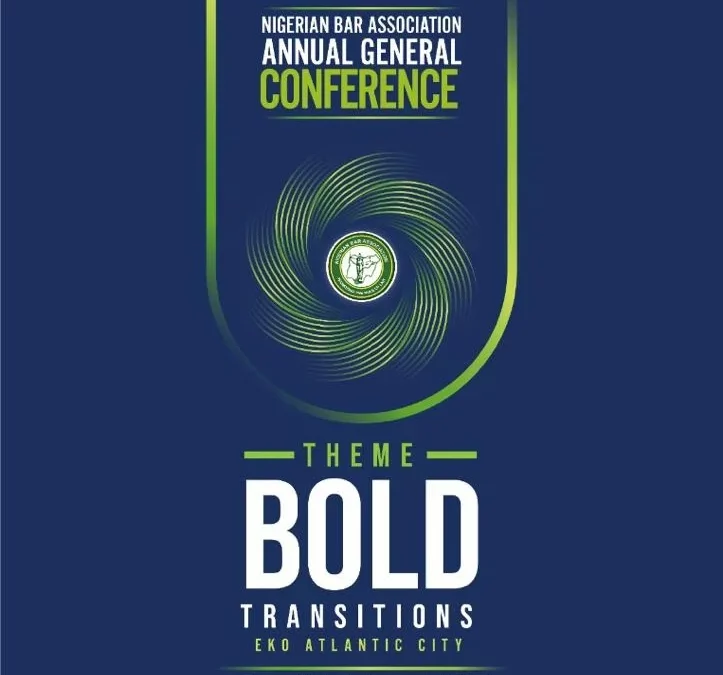
by Legalnaija | Jun 12, 2022 | Uncategorized
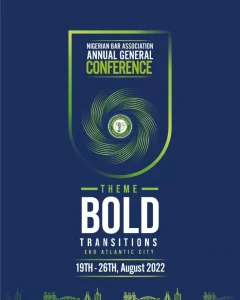
The Technical Committee on Conference Planning (TCCP) for the 2022 Annual General Conference (AGC) of the Nigerian Bar Association (NBA) is pleased to announce the commencement of registration for the 62nd NBA Annual General Conference.
Registration for the conference commences today, June 12th, 2022, at www.nbaconference.com, with an early bird registration window which closes on 17th July 2022. Participants will be able to register for either physical attendance or virtual attendance.
The conference will hold at the Eko Atlantic City, Victoria Island, Lagos from 19th to 26th August, 2022 with the theme “Bold Transitions”. Renowned Nigerian author, Chimamanda Ngozi Adichie, will be the Keynote Speaker.
Regular registration for the conference will start on 18th July and end on 5th August, 2022. Late registration will run between 6th and 12th August, 2022, while registration for virtual attendance will be on an ongoing basis.
“The core objective of the 62nd edition of the NBA Annual General Conference is to host a world-class conference, with in-depth discourse on critical issues affecting the legal profession and the country, facilitated by the most eminently qualified resource persons able to galvanize all conference attendees towards the path of becoming better legal practitioners and experts in their chosen fields; shape public opinion on critical issues; and inspire lawyers to build the law firms of the future,” said Tobenna Erojikwe, Chairman, Technical Committee on Conference Planning (TCCP).
The registration fees are broken down according to categories. There has also been a significant reduction in the fees for virtual attendance compared to 2021.
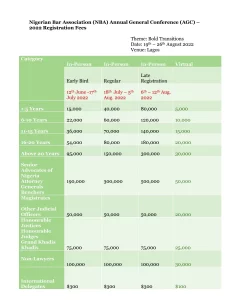
Lawyers in the category of 1-5 years of practice will pay N15,000 for early bird registration, N40,000 regular registration, N80,000 for late registration, and N5,000 for virtual attendance as against N7,500 charged last year.
Lawyers within the 6-10 years category will register with N22,000 for early bird, N60,000 for regular, N120,000 for late registration, and N10,000 if they want to participate virtually compared to N11,250 they paid for virtual participation last year.
Lawyers who have practiced between 11-15 years will pay N36,000 registration fee if they make use of the early bird window, N70,000 for regular registration, N140,000 for late registration, and N15,000 for virtual attendance, N3,000 less than the N18,000 they were charged last year.
For lawyers between 16-20 years, the cost is N54,000 for early bird, N80,000 for regular, N180,000 for late registration, and N20,000 for virtual registration compared to N27,000 paid in 2021.
Lawyers who have more than 20 years of practice will pay N95,000 if they come as early bird, N150,000 for regular, N300,000 for late registration, and N30,000 for virtual attendance, a whopping N17,500 reduction from what it cost them to attend virtually in 2021.
Senior Advocates of Nigeria, Attorneys General, and Benchers will pay N190,000 early bird, N300,000 regular, N500,000 late registration, and N50,000 for virtual participation, N45,000 less than the N95,000 they paid last year.
It will cost Magistrates and other Judicial Officers N50,000 to register if they use the early bird window, N50,000 regular, N50,000 late registration, and N20,000 for virtual attendance compared to N25,000 for last year.
Honourable Justices, Honourable Judges, Grand Khadis and Khadis will pay N75,000 registration whether they come as early bird, regular registration or late registration. However, if they wish to participate virtually, the cost is N25,000 instead of N37,500 they paid in 2021.
For non-lawyers who want to attend the conference, the fee is N100,000 irrespective of whether it is early bird, regular or late registration. If they want to register to attend virtually, the fee is N30,000, N20,000 less than last year’s fee.
International Delegates will pay a fee of $300 for either early bird, regular or late registration, but $100 for virtual attendance, $50 less than last year’s fee.
“The AGC will bring together thought leaders in the areas of justice delivery, technology, economy, politics, judicial reforms, human rights, and rule of law. The aim is to have leading lawyers and thought leaders in the various fields to discuss and harmonise positions on the way forward on building a more effective Bar and a resilient country able to thrive amidst changing global dynamics,” Erojikwe said.
About NBA
The Nigerian Bar Association (NBA) is the non-profit, umbrella professional association of all lawyers admitted to the Bar in Nigeria and a member of all statutory bodies that regulate the Nigerian Bar and Bench.
The NBA is Nigeria’s foremost and oldest professional membership organisation and Africa’s most influential network of legal practitioners, with over 120,000 lawyers on its roll in 125 active branches across the 36 States and the Federal Capital Territory of Nigeria. It is organised into three practise Sections, eleven Fora, and two Institutes, all supported by one National Secretariat.
The NBA is engaged in the promotion and protection of human rights, the rule of law and good governance in Nigeria. It has an observer status with the African Commission on Human and People’s Rights, and a working partnership with many national and international governmental and non-governmental organisations concerned with human rights, the rule of law and good governance in Nigeria and across the world.
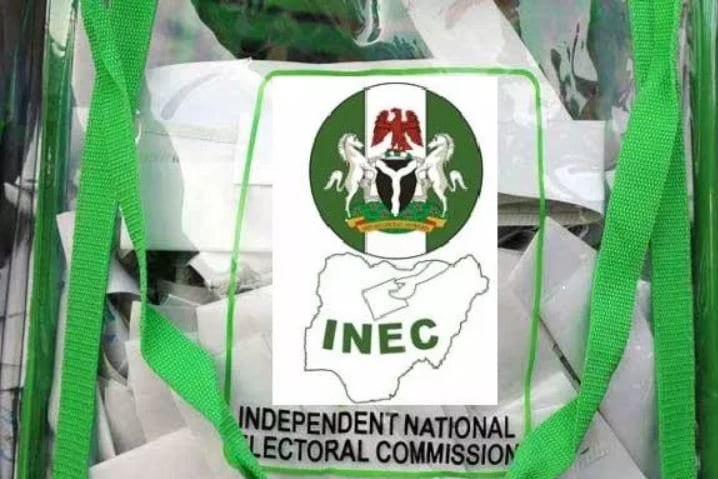
by Legalnaija | May 31, 2022 | Uncategorized

Now that Pre-elections (activities before elections) are underway, we should expect catalogues of Law suits. After elections in 2023, the flood gates of cases will be opened. Lawyers will smile to the bank, the same way delegates are currently smiling. “Lucky” Politicians will have the courts declare them the winner of an election, notwithstanding the official results as would be declared by the National body responsible for conducting elections in Nigeria, to wit: INEC. (Independent National Electoral Commission).
To be candid, the populace might not necessarily have the final say as to who wears the crown after an electoral exercise has been carried out in Nigeria. It is the court. (more…)

by Legalnaija | May 13, 2022 | Uncategorized
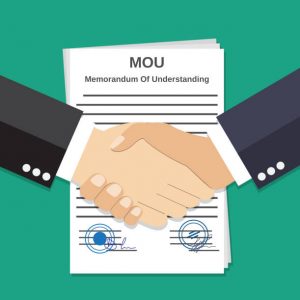
A Memorandum of Understanding (MOU) is a written statement detailing the preliminary understanding of parties who plan to enter into a contract or some other agreement. In other words, an MOU is a document that describes the formal agreement between parties wishing to enter into an agreement. It should be noted an MOU may be non – binding and is sometimes referred to as a Letter of Intent.
An MOU should contain the following clauses;
A letter agreement can be as long or as short as necessary to cover the points you wish to include, but you should describe the terms as completely and clearly as possible. Using the example above, a letter agreement might include:
- The name and address of parties
- The date of the agreement
- A description of the parties
- A description of the reason behind the agreement
- Obligations of the parties
- Miscellaneous provisions, such as choice of law, jurisdiction, notices, assignment, amendments, and counterparts.
- Your signatures and the date.
If you have more questions about how to draft an MOU, it is suggested that you speak to a lawyer, and if you will like to draft an MOU by yourself, you may use our MOU Template.
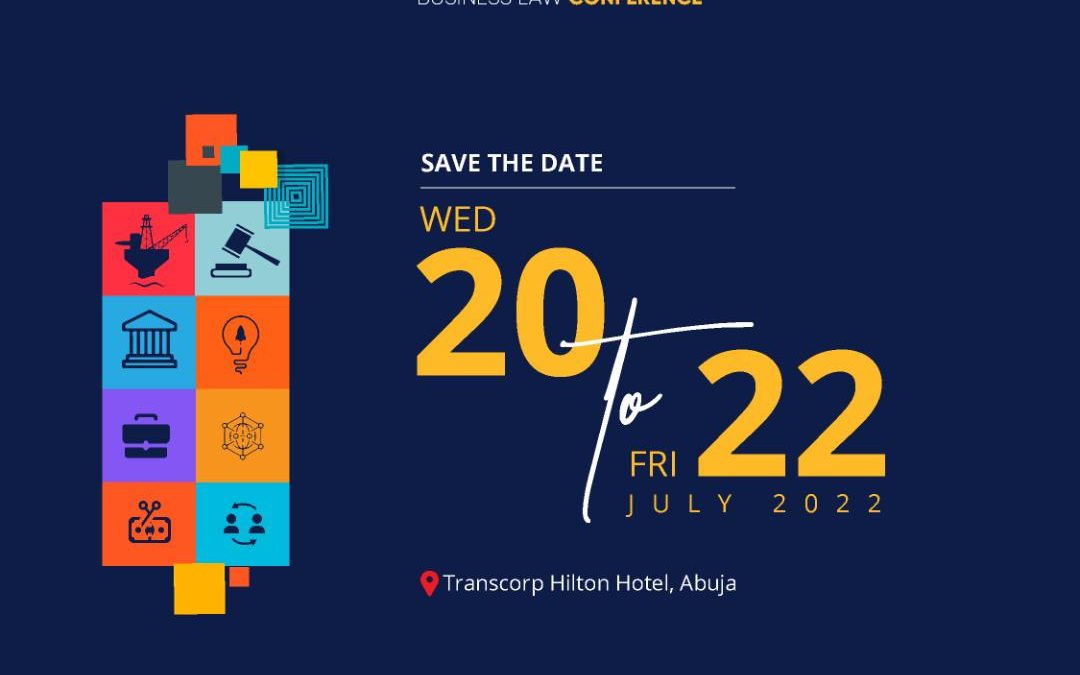
by Legalnaija | May 12, 2022 | Uncategorized

The Nigerian Bar Association Section on Business Law (NBA-SBL) has released a schedule of programmes for its 16th Annual International Business Law Conference billed to hold at the Transcorp Hilton Hotel Abuja from Wednesday, 20th to Friday, 22nd July 2022.
The programme schedule released by the 2022 Conference Planning Committee shows that the conference, themed “Recent Developments in the Business Law Environment”, will feature 11 plenary sessions.
According to the programme schedule, the sub-themes for the sessions include “CAMA 2020: The Journey So Far”; “ESG and the Nigerian Business Environment”; “In-house & External Counsel Relationship – New Trends and Expectations”; “Tackling the Challenges of Ponzi Schemes: Insolvency as a Resolution Tool”; and “AfCTFA – The Prospects for the Nigerian Business Lawyer”. (more…)

by Legalnaija | May 10, 2022 | Uncategorized

What is a photo licensing agreement?
A photo licensing agreement grants others the license to use a photographer’s images and the user may only use the image within the bounds of the agreement.
How it works
As a photographer, your job is to take pictures and you must have taken some very amazing pictures in your career. Imagine these pictures have now caught the attention of the world and you have brands and celebrities wanting to feature your photograph in their work.
A licensing agreement is the legal document you sign with the brand or company wanting to use your work. In this relationship, the photographer is known as the Licensor, while the company or brand is known as the licensee.
In essence, a photo licensing agreement is a contract between two parties, the licensor (the photographer who owns the copyright and is licensing the rights to use the image) and the licensee (the person or company wanting to and gaining the right to use the image).
The advantage to photographers
As a photographer, learning how to license your images is an essential skill if you want to make extra income from your photography practice.
What should be in a licensing agreement?
Terms contained in a licensing agreement include the description of the image being licensed; the duration of the license; the amount paid for the license and the ways in which the image may be used among several other things.
If you are considering getting a licensing agreement for your images, you can customize and download one in less than 5 minutes to your email. Plus its cheaper, faster and easier.
Simply visit legalnaija.com to get started.
@Legalnaija
www.legalnaija.com

by Legalnaija | May 10, 2022 | Uncategorized
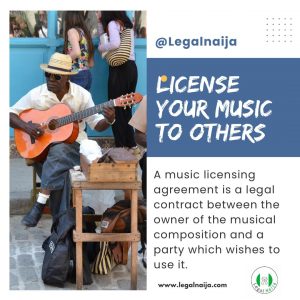
What is a music licensing agreement?
A music license agreement is a legal contract between a copyright holder (musician) and another party to allow them to use their copyrighted material (music).
How it works
As a musician or producer, you must have recorded or mixed some amazing songs in your career. Now imagine, a brand or company wants to use your song in a promotional material, jingle or movie.
A licensing agreement is the legal document you sign with the brand or company wanting to use your work. In this relationship, the musician or producer is known as the Licensor, while the company or brand is known as the Licensee.
A music license agreement should specify the rights that will be granted:, what territory or countries it applies in, whether it’s exclusive or non-exclusive, and how royalties will be paid out. It may also specify things like when ownership reverts back to the copyright holder (in case of termination), who owns derivative works created under this agreement, and where all parties agree on jurisdiction should any disputes arise.
The benefit of licensing your work can be quite substantial including more financial income for the musician or producer.
If you are considering getting a licensing agreement for your images, you can customize and download one in less than 5 minutes to your email. Plus its cheaper, faster and easier.
Simply visit legalnaija.com to get started.
@Legalnaija
www.legalnaija.com
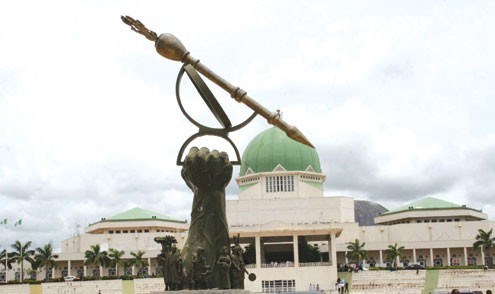
by Legalnaija | Apr 23, 2022 | Uncategorized
Since the inclusion of the word “Consensus” into our Electoral Act, a new tunnel of excitement has been created in our political space and as one can see; Political parties seem to have found a new vehicle upon which to ride against the will of others within the same part.
It is often said and correctly so that a piece of iron only becomes what the blacksmith decides it should become and this aptly represents the activities of the Major Political parties in Nigeria as they have tailored the word Consensus into a cloth even the literal meaning of the word cannot wear.
Many Lawyers have expressed views on the fate of various Consensus arrangements that have littered our polity if tested in the courts largely owing to how these Consensus are being reached in relation to the wording and spirit of the Electoral Act.
This Writer examines the position of Law as regards the Nomination process of parties and particularly the delima of an Aspirant dissatisfied with such a Nominations process.
It was Law not so far back from today that the decision of a Political Party on the choice of it’s Candidate was non justiciable and thus was not litigable in any Court of Law. This position was hinged on the fact that in dealing with a voluntary association of individuals, the doctrine of ultra vires has no place.
Thus in Onuoha v Okafor & Ors, The Court of Appeal Per Olatawura, JCA (as he then was) stated inter Alia that: “Political parties should be the sole arbiter of who should represent them…….A member of a political party who is disenchanted with the party has one honourable course open to him; to resign from the party and may decide to join another party or stay away from politics”
What the above conveys is that a claim that a person was not validly nominated as a candidate of a party amounts to an invitation to the Court to take over the an internal Matter of the management of the party. This means that An Aspirant dissatisfied with the nomination of another as candidate for a position for which he aspired could only explore the internal mechinery of the party and not a Court of Law.
The Supreme Court per Obaseki JSC in the matter stated above noted inter alia that:
” The failure to sponsor the appellant cannot be said to be in breach or ultra vires the powers of the NPP because the appellant won the nullified nomination or because the appellant paid N5000.00 to contest the nomination. The NPP being a registered Political party has the same capacity as a natural person to make it’s choice of a candidate for sponsorship”
The Court of Appeal went further to hold in Ogunbiyi v Ogundipe that the issue of who becomes a candidate of a given party at any election was clearly a political one to be determined by the rules and the constitution of the said party and thus a domestic issue which was not justiciable in a Court of Law.
In the face of the above position of Law however,The Electoral Act 2022 has made very interesting stipulations that have opened a floodgate of legal views and analysis as it appears to ambushed and put to question the non justiciability of a decision of a political party on the choice of a candidate.
Section 84 subsection 2 of the Electoral Act 2022 provides for three ways by which the choice of a candidate shall be arrived at by Political parties viz Direct primaries, Indirect Primaries and by Consensus.
Like ants crowding a cube of sugar, Political parties have found convenience in the method of Consensus. However like the biblical rhetoric “what good can come out of Nazareth”, the implementation of the procedure for consensus by Political parties has left one wondering what good can come out of the Nigerian Political space.

Buy Now on the Legalnaija Bookstore
From outright coercion to the absolute absence and non endorsement of the consensus arrangements by all the aspirants, the process seems to fall squarely on the shoulders of the “Stakeholders” of the party.
The Electoral Act 2022 in section 84 subsection 9 stipulates to the effect that the written consent of all cleared aspirants indicating their voluntary withdrawal and endorsement of the consensus candidate shall be obtained.
The above section raises the impression that the aspirants who have been cleared are the most important actors in a Consensus nomination of a Candidate by a political party.
This presumption also finds strength in the words of section 84 subsection 11 and 12 of the Electoral Act 2022.
Subsection 11 reads: ” Where a political party fails to comply with the provisions of this Act in the conduct of it’s Primaries, it’s candidate for election shall not be included in the election for the particular position in issue”
Subsection 12 reads: “Notwithstanding the provisions of this Act or rules of a political party, an Aspirant who complains that any of the provisions of this Act or guidelines of a party have not been complied with in the selection or nomination of a candidate of a political party may apply to the Federal High Court for redress”.
The question that begs for an answer in view of the the earlier stated position of Law giving judicial backing by the courts is what redress will such an Aspirant dissatisfied seek in the Federal High Court?
It is important at this junction to mention that non compliance to the electoral act is a valid ground upon which to challenge a person’s candidacy and must thus be separated from the non justiciability of the Choice of a candidate in an election by a political party.
Many are of the strong opinion that the Supreme Court decision in Mato v Hembe has made the nomination of candidates by Political parties litigable and thus it seizes to be a political matter to be resolved by the party mechanism but can now be justiciable by the Court of Law.
This writer humbly disagrees with that view and holds that The Supreme Court in that case didn’t necessarily set a precedent to allow Courts litigate the decision of a political party on the choice of candidate and mine is hinged on very perculiar features of that case particularly the non compliance to the electoral act as well as the constitution.
In Mato v Hembe, the Supreme Court agreed first and foremost that as at the 10th of December 2014 which was the the day the Primaries of the APC was purportedly conducted for the Vandeikya/Konshisha Federal Constituency, Herman Hembe was not a Member of the APC as he only validly resigned his membership of the PDP on the floor of the House of Representatives on the 16th of December 2014; six days after the APC primaries was said to be conducted and the said Hembe returned as candidate of the party.
It flows from the above, that by the provisions of the Electoral Act then which is still the case now, a non member of a political party cannot be the candidate of that party at an election.
This doesn’t amount to interfering with the choice of a Party’s candidate but ensuring the application of the Electoral Act because one must first be a Member of a political party before one can be the candidate of it.
Would the Supreme Court have held differently if Hembe was a valid member of the APC? Absolutely Yes would be my answer. But once his non membership of the party was established, it seized to be a political matter in the hands of the Political party but a matter of electoral compliance.
It is thus my position that until the Courts pronounce to the contrary, the choice of a candidate at an election is still a political matter at the discretion of the Political party and is consequently non justiciable.
To answer the question of ” redress” as mentioned earlier, in Balonwe v Chinyelu, the Court of Appeal Per Oguntade JCA observed that:
” Even if the problem was settled in a manner the plaintiff found unsatisfactory, she might have a cause of action founded on a breach of contract (i.e the Constitution of the Party) that she was not allowed to run ad the party’s candidate when she had fulfilled the requirements laid down by the party’s constitution. Such action can only be one in damages, not for specific performance. The Court will not and ought not to choose a candidate for a political party.”
Also in the earlier stated case of Onuoha v Okafor & Ors. Olatawura JCA stated inter alia:
” …….if there is any claim , the plaintiff can maintain against his party, i.e the 2nd defendant, it is in my view an action for damages for their failure to sponsor him”.
I must state in conclusion that on the shoulders of the mentioned subsections of section 84 of the Electoral Act 2022, interesting times seem to lie ahead as we match to elections. The Act was only recently passed and I anticipate a development of case Law and Judicial pronouncements that would give depth to our politics going forward based on the charades been carried out in the name of Consensus by the political parties in Nigeria as we wait to see how much they comply to the Electoral Act 2022.
 Adamu Terungwa Dominion Esq is Legal Practitioner at Olumide Ayeni SAN & Co. with special interest in Litigation, Fintech and Commercial Law. He is a member of the Africa Business Club.
Adamu Terungwa Dominion Esq is Legal Practitioner at Olumide Ayeni SAN & Co. with special interest in Litigation, Fintech and Commercial Law. He is a member of the Africa Business Club.

by Legalnaija | Apr 19, 2022 | Uncategorized
What is Artificial Intelligence?
The world is witnessing great advancements in technology. The term Artificial Intelligence (AI) was coined by John McCarthy, Alan Turing, Marvin Minsky, Nathaniel Rochester, and Claude E. Shannon in a proposal that they wrote for the famous Dartmouth conference in the Summer of 1956.[1] The development of Artificial Intelligence has made things easy for both businesses and the government. Artificial intelligence (AI) are system designed and programmed to work or act like humans. The process includes AI solving complex problems, learning, and improving themselves over time. At the rate the technology is developing, experts believe that AI will eventually mimic and perform tasks like a human.[2] Artificial Intelligence (AI) is one such technical field that is transforming human society into one of robots and machines. AI includes machine learning, natural language processing, big data analytics, algorithms, and much more.[3] According to Wikipedia Artificial intelligence is intelligence demonstrated by machines, as opposed to the natural intelligence displayed by animals including humans.[4] According to Britannica artificial intelligence (AI), is the ability of a digital computer or computer-controlled robot to perform tasks commonly associated with intelligent beings. The term is frequently applied to the project of developing systems endowed with the intellectual processes characteristic of humans, such as the ability to reason, discover meaning, generalize, or learn from past experience.[5]
From the various definitions, artificial intelligence is the ability of machines to do what humans can do and achieve the same results. Sometimes, these results are achieved faster. Some people have argued that the results achieved by artificial intelligence are not just faster but more accurate than those achieved by humans[6], while others argue that Artificial Intelligence cannot replace human intelligence.[7]
Regardless of the school of thought that one subscribes to, Artificial Intelligence has come to stay and will continue to make an impact on our daily lives.
Advantages of Artificial Intelligence
Artificial intelligence has both its good and bad sides. According to Sunil Kumar[8], the following are the advantages and disadvantages of Artificial Intelligence.
1) Reduction in Human Error:
The phrase “human error” was born because humans make mistakes from time to time. Computers, however, do not make these mistakes if they are programmed properly. With Artificial intelligence, the decisions are taken from the previously gathered information by applying a certain set of algorithms. So errors are reduced and the chance of reaching accuracy with a greater degree of precision is a possibility.
2) Takes risks instead of Humans:
This is one of the biggest advantages of Artificial intelligence. We can overcome many risky limitations of humans by developing an AI Robot which in turn can do the risky things for us. Let it be going to mars, defusing a bomb, exploring the deepest parts of oceans, mining for coal and oil, it can be used effectively in any kind of natural or man-made disaster.
3) Available 24/7:
An Average human will work for 4–6 hours a day excluding the breaks. Humans are built in such a way to get some time out for refreshing themselves and get ready for a new day of work and they even have weekly offed to stay intact with their work-life and personal life. But using AI we can make machines work 24×7 without any breaks and they don’t even get bored, unlike humans.
4) Helping in Repetitive Jobs:
In our day-to-day work, we will be performing many repetitive works like sending a thanking mail, verifying certain documents for errors, and many more things. Using AI, we can productively automate these mundane tasks and can even remove “boring” tasks for humans and free them up to be increasingly creative.
5) Digital Assistance:
Some highly advanced organizations use digital assistants to interact with users which saves the need for human resources. Digital assistants are also used on many websites to provide things that users want. We can chat with them about what we are looking for. Some chatbots are designed in such a way that it’s become hard to determine whether we’re chatting with a chatbot or a human being.
6) Faster Decisions:
Using AI alongside other technologies we can make machines take decisions faster than a human and carry out actions quicker. While taking a decision humans will analyse many factors both emotionally and practically but an AI-powered machine works on what it is programmed and delivers the results in a faster way.
7) New Inventions:
AI is powering many inventions in almost every domain which will help humans solve the majority of complex problems. For instance, doctors can predict breast cancer in women at earlier stages using advanced AI-based technologies.
As every bright side has a darker version in it. Artificial Intelligence also has some disadvantages. Here are some of them as espoused by Sunil[9]
1) High Costs of Creation:
As AI is updating every day the hardware and software need to get updated with time to meet the latest requirements. Machines need repairing and maintenance which need plenty of costs. Its creation requires huge costs as they are very complex machines.
2) Making Humans Lazy:
AI is making humans lazy with its applications automating the majority of the work. Humans tend to get addicted to these inventions which can cause a problem for future generations.
3) Unemployment:
As AI is replacing the majority of the repetitive tasks and other work with robots, human interference is becoming less which will cause a major problem in the employment standards. Every organization is looking to replace the minimum qualified individuals with AI robots that can do similar work with more efficiency.
4) No Emotions:
There is no doubt that machines are much better when it comes to working efficiently but they cannot replace the human connection that makes the team. Machines cannot develop a bond with humans which is an essential attribute when comes to Team Management.
5) Lacking Out of Box Thinking:
Machines can perform only those tasks which they are designed or programmed to do, anything out of that they tend to crash or give irrelevant outputs which could be a major backdrop.
Artificial intelligence and Human Rights
Human rights are the basic rights and freedoms which citizens enjoy. In Nigeria, these rights are enshrined in Chapter 4 of the Constitution.[10] Some of these rights include:
1. Right to life
2. Right to Dignity of the human person,
3. Right to Personal Liberty
4. Right to Fair Hearing
5. Right to Private and Family Life
6. Right to peaceful assembly and association
7. Right to freedom of movement
8. Right to freedom from discrimination
9. Right to acquire and own immovable property in Nigeria
As artificial intelligence continues to make inroads into human activities, the potential for breach of human rights is not minimal. Artificial intelligence has helped humans to be efficient and achieve more within a short time. However, the risk it poses to human rights needs to be checked. “Artificial intelligence can be a force for good, helping societies overcome some of the great challenges of our times. But AI technologies can have negative, even catastrophic, effects if they are used without sufficient regard to how they affect people’s human rights”.[11]
It is ultimately up to businesses to carefully consider the opportunities new technologies provide and how they can best leverage these opportunities while being conscious of the impact on human rights.[12] Here are some ways that Artificial Intelligence affects human rights.
Breach of Data protection and privacy
Artificial intelligence gathers data from people without their consent. For instance, data is gathered from mobile and electronic devices, to assist some organisations to make data-driven decisions or sending tailored adverts. Data collected by means of AI also raises privacy issues like informed consent freely given, being able to opt-out, limiting data collection, describing the nature of AI processing, and even being able to delete data on request. However, how would human subjects of the collected data, perhaps given a spillover effect, even know data was collected about them to be able to make any inquiries of organizations with respect to their own data or to request that it be deleted?[13]
Freedom of Expression
Artificial intelligence stifles freedom of expression. A number of social media platforms, have AI that flags people’s posts and sometimes outrightly deletes them. However, no one knows the yardstick or criteria used to flag or judge certain contents as illegal. This tends to limit the right to freedom and expression and also the right to freedom of association, especially in cases users are suspended and their accounts deleted.
Discrimination
To curb crime, there are AI developed to recognize faces. There have been complaints that it promotes discrimination and racism. According to Amnesty International, the technology exacerbates systemic racism as it could disproportionately impact people of colour, who are already subject to discrimination and violations of their human rights by law enforcement officials. Black people are also most at risk of being misidentified by facial recognition systems.[14] Machines function on the basis of what humans tell them. If a system is fed with human biases (conscious or unconscious) the result will inevitably be biased. The lack of diversity and inclusion in the design of AI systems is therefore a key concern: instead of making our decisions more objective, they could reinforce discrimination and prejudices by giving them an appearance of objectivity.[15]
Liability for damages
Who becomes responsible for damages in cases where AI has caused harm? AI can cause harm and people and property. For instance, where a driverless car causes an accident, who should be liable? Unlike where a driver who drives negligently and causes an accident, he may be liable in Tort for damages or in criminal law for dangerous driving. But with AI, who should a victim hold responsible or institute an action against? It is difficult to establish liability with AI. As there are many parties involved in an AI system (data provider, designer, manufacturer, programmer, developer, user, and AI system itself), liability is difficult to establish when something goes wrong and there are many factors to be taken into consideration.[16]
Right to Life
Although rare, Robots have been known to cause death and deprive people of the right to life. The first person reported to have died from the blows of a Robot was Robert William.[17] Since that incidence, there have been other cases of deaths from machines. The deployment of drones to curb the activities of terrorists has also resulted in the deaths of civilians.[18] Innocent people losing their lives because of the inability of drones to distinguish between who is a terrorist and who is not, especially when these terrorists infiltrate their communities.
Recommendations
From the foregoing, although AI has greatly impacted human activity, care must be taken with its implementation, especially as it affects human rights. These machines are built by man and can only do what they are programmed to achieve. There is a need to achieve a balance between the deployment of artificial intelligence and human rights.
There should be a collaborative effort between stakeholders (that is government, business, scientists, non-governmental organisations, etc.) in the deployment of artificial intelligence. A periodic review of the impact of AI on human rights and the ways to improve the capacity of these machines to respect these rights.
Secondly, there should be an increase in people’s “AI literacy”. States should invest more in public awareness and education initiatives to develop the competencies of all citizens, and in particular of the younger generations, to engage positively with AI technologies and better understand their implications for our lives. Finally, national human rights structures should be equipped to deal with new types of discrimination stemming from the use of AI.[19]
There is an urgent need for transparency by companies and individuals who are developing and deploying AI on how it influences their business decision, steps that they have taken to minimise its impact on human rights, etc. In addition to this, there is also a great need to set boundaries for the use of AI. A blanket application of AI without these boundaries would translate into an unwillingness to checkmate its impact on human rights.
Conclusion
The impact of AI cannot be over-emphasised. However, the human rights concern of AI should not be overlooked. It is imperative for a balance to be created between the two. AI should not be implemented in a vacuum. An international human rights framework to set a threshold and minimum standards for the application of AI should be created.
Endnotes
*Partner at Springfield Law Practice
[1] https://en.wikipedia.org/wiki/John_McCarthy_(computer_scientist)
[2] Ben Hartwig the Impact of Artificial Intelligence on Human Rights available on https://www.dataversity.net/the-impact-of-artificial-intelligence-on-human-rights/# accessed on 5/4/2022
[3] https://blogs.lse.ac.uk/humanrights/2020/07/16/beginning-of-artificial-intelligence-end-of-human-rights/ accessed on 7//4/2022
[4] https://en.wikipedia.org/wiki/Artificial_intelligence
[5] https://www.britannica.com/technology/artificial-intelligence
[6] Kevin Gardner, https://towardsdatascience.com/how-ai-is-helping-efficiency-improve-98d0171a23e2
[7] Sakshi Gupta, Artificial Intelligence vs. Human Intelligence: who will build the future?
[8] https://towardsdatascience.com/advantages-and-disadvantages-of-artificial-intelligence-182a5ef6588c
[9] Ibid
[10] Constitution of the Federal Republic of Nigeria, 1999 as amended
[11] Michelle Bachelet UN High Commissioner for Human Rights, https://news.un.org/en/story/2021/09/1099972
[12] Hartwig, no.2 above
[13] Guy Pearce, Beware of Privacy Violations in Artificial Intelligence Applications, https://www.isaca.org/resources/news-and-trends/isaca-now-blog/2021/beware-the-privacy-violations-in-artificial-intelligence-applications, accessed om 11/4/2022
[14] https://www.amnesty.org/en/latest/news/2021/01/ban-dangerous-facial-recognition-technology-that-amplifies-racist-policing/
[15] https://www.opendemocracy.net/en/digitaliberties/in-era-of-artificial-intelligence-safeguarding-human-rights/
[16] Gluyas L, Day S (2018) Artificial Intelligence – Who Is Liable When AI Fails To Perform? CMS Cameron McKenna Nabarro Olswang LLP. https://cms.law/en/GBR/Publication/Artificial-Intelligence-Who-is-liable-when-AI-fails-to-perform
[17] He was struck on the head by a Robot at Ford’s Flat Rock Plant in Michigan on January 25, 1975. https://www.wired.co.uk/article/robot-death-wanda-holbrook-lawsuit
[18] https://www.nytimes.com/2022/01/19/us/politics/afghanistan-drone-strike-video.html



















 Adamu Terungwa Dominion Esq is Legal Practitioner at Olumide Ayeni SAN & Co. with special interest in Litigation, Fintech and Commercial Law. He is a member of the Africa Business Club.
Adamu Terungwa Dominion Esq is Legal Practitioner at Olumide Ayeni SAN & Co. with special interest in Litigation, Fintech and Commercial Law. He is a member of the Africa Business Club.